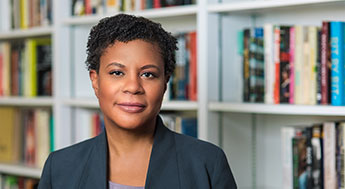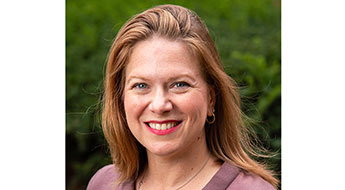New Faculty Set to Boost IPR in Key Research Areas
Experts in education, politics, crime, and development enhance research capacity
Get all our news

Clockwise from top left: New IPR fellows Andrew Papachristos, John Bullock, Julia Behrman, and Ofer Malamud.
Two new fellows have joined IPR this fall, political scientist John Bullock and economist Ofer Malamud, with two more, sociologists Andrew Papachristos and Julia Behrman, arriving in 2018.
“IPR has a unique interdisciplinary perspective when it comes to policy research, so we are very excited to welcome these four new fellows into the IPR fold,” said Diane Whitmore Schanzenbach, IPR director and economist. “Our new colleagues are all conducting remarkable research in diverse areas with clear policy impact, and we look forward to their contributions and our collaborations with them.”
The new fellows will add their expertise to the Institute's more than 140 IPR faculty fellows and associates, representing 33 departments and divisions across nine of the University’s 12 schools.
New IPR Fellows 2017–2018
Bullock studies how partisanship affects people’s political views. For example, he investigates how partisan polarization might affect bias in political thinking, or whether people make sensible political choices when they generally know little about politics. These themes have led him to tackle concerns about “fake news” and partisan response patterns in surveys, to cite a few.
One of Bullock’s current research projects is among the first to examine how education might influence adults’ economic views. Culling data from cross-sectional and longitudinal surveys, he uncovers a surprising result of a U.S. high school education: It seems to push Americans toward a more accepting, and more conservative, view of economic inequality, making them less likely to favor redistributive programs, such as progressive income taxes and antipoverty programs.
“John’s findings on the relationship between education and attitudes about redistribution are critically important for those of us who care about inequality and how people come to their beliefs about how to ameliorate inequalities,” said James Druckman, IPR political scientist and associate director, in discussing the importance of Bullock’s work.
Bullock has published his research in the American Political Science Review, Journal of Personality and Social Psychology, Journal of Politics, and Quarterly Journal of Political Science, among others. He earned his PhD from Stanford University and was at the University of Texas at Austin before joining IPR and Northwestern as an associate professor of political science this September.
Ofer Malamud (Education and Social Policy)
A labor economist, Malamud studies the underlying mechanisms of education, asking why, for instance, education improves outcomes and how skills develop over a person’s life. His research extends to other countries, such as Chile, Israel, Peru, and Romania, in addition to the United States.
“Ofer’s exciting research examines core human capital questions in various settings,” said IPR economist Kirabo Jackson. “By being attentive to both the similarities and differences that exist across national contexts, his research helps shed light on the underlying reasons why some policies may work in one context but not in others.”
One of Malamud’s current projects involves the Millennium Challenge Corporation. As a principal investigator, he is examining the potential for technical and vocational education to improve labor market outcomes in Mongolia. In preliminary work, he has found that admission to, and graduation from, technical and vocational schools leads to improved employment chances and higher earnings—especially for women.
Malamud, who received his PhD in economics from Harvard University, comes to IPR as an associate professor in Northwestern’s School of Education and Social Policy from the University of Chicago. His research has been published in a variety of journals, including the Quarterly Journal of Economics, American Economic Journal: Applied Economics, Journal of Public Economics, and the Review of Economics and Statistics. He is a research associate at the National Bureau of Economic Research (NBER) and a research consultant for the Federal Reserve Bank of Chicago. He was a visiting fellow at the Brookings Institution in 2016–17.
Andrew Papachristos (Sociology)
A native Chicagoan who received his PhD from the University of Chicago, Papachristos is currently on the faculty at Yale University, but will join IPR and Northwestern as a fellow and professor of sociology in January. Broadly, he applies network science to the study of gun violence, police misconduct, illegal gun markets, street gangs, and urban neighborhoods.
Currently, he is completing a manuscript on the evolution of African-American street gangs and politics in Chicago from the 1950s to the early 2000s. Papachristos has also evaluated gun-violence prevention programs in more than a dozen U.S. cities, most notably the Project Safe Neighborhoods and the Group Violence Reduction Strategy in Chicago.
“Andy’s work has been fundamental in understanding the causes of neighborhood violence and in helping to point us toward solutions,” said Lincoln Quillian, IPR sociologist and chair of IPR’s research program on Urban Policy and Community Development. “He is the perfect scholar to bring together Northwestern’s strengths in criminology, legal studies, neighborhoods, and social networks.”
Papachristos will also launch the Northwestern Neighborhood and Network Lab (N3 Lab) at IPR, a space for research and policy engagement around cutting-edge developments and applications of neighborhood research and network science to the study of urban inequality, more broadly, and crime, violence, and the law, more specifically.
His work has been published in JAMA, American Sociological Review, Criminology, and the American Journal of Public Health, among others. Papachristos received a National Science Foundation Faculty Early CAREER Development award to examine how violence spreads through high-risk social networks in several U.S. cities, and was also a Robert Wood Johnson Foundation Health & Society Fellow at Harvard University.
Julia Behrman (Sociology)
Behrman is currently on leave as a postdoctoral fellow in sociology at Oxford University and will arrive at the University and IPR as an assistant professor and fellow in fall 2018. Her research explores the relationship between inequality in educational opportunity and demographic processes, notably fertility and family formation, and she is especially interested in sub-Saharan Africa and South Asia.
In sub-Saharan Africa, Behrman examines school expansion and social mobility across generations, looking at the quality of the schooling and intergenerational mobility in school progression and skill acquisition. She is also analyzing the interplay between women’s paid employment opportunities and the number of children young women desire in African countries with very high fertility rates.
“Julia brings a sociological and demographic perspective to a wide range of crucial questions about gender and development, said IPR sociologist Christine Percheski. “Her research on the impacts of natural disasters on women’s reproductive health and exposure to intimate partner violence is particularly innovative and groundbreaking.”
Behrman received her PhD in sociology from New York University and has received awards from several organizations, including the American Sociological Association and Population Association of America. Her research has been published in Demography, the Journal of Adolescent Health, and Population and the Environment, in addition to other journals.
Published: September 28, 2017.


